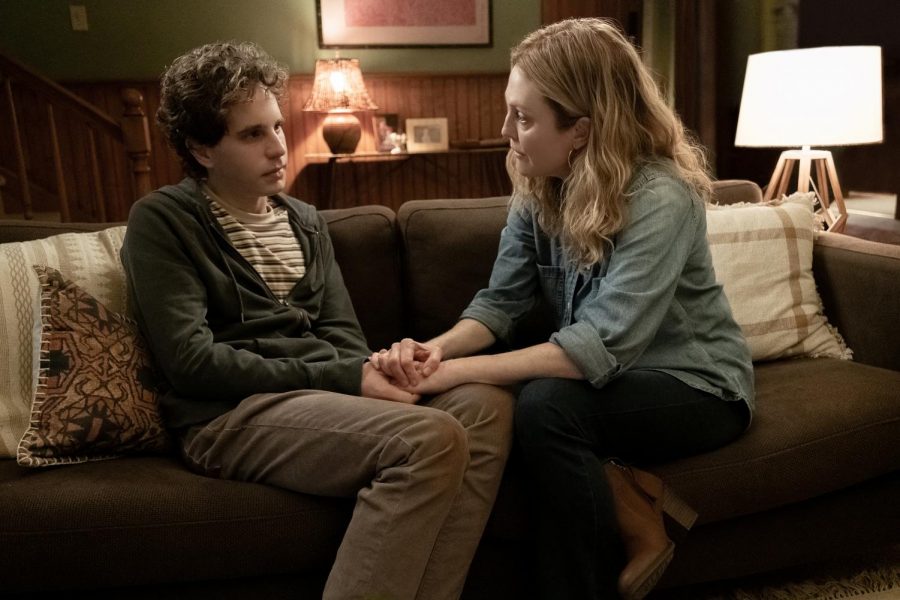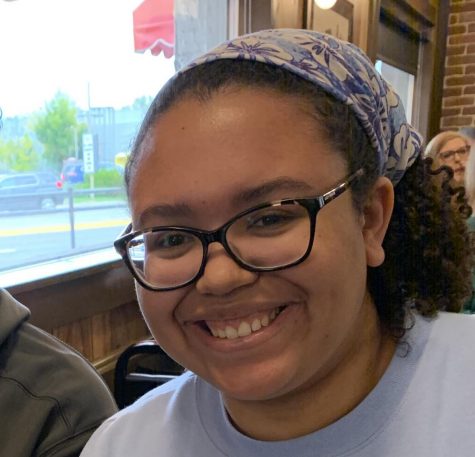Review | “Dear Evan Hansen” pales in comparison to the stage show
Erika Doss | Universal Pictures, TNS
Ben Platt, left, and Julianne Moore in “Dear Evan Hansen.”
September 27, 2021
I’ll be honest — I’ve been a fan of “Dear Evan Hansen” since it came out in 2017. I used to listen to it with my dad and brother on car rides. The song “So Big/So Small” makes me cry every time I hear it, and while I make fun of the fact that every song has a dramatic key change right before the final chorus, I still love the soundtrack.
I just wish I could say the same about the recent film adaptation.
The cinematic version of the Tony Award-winning Broadway musical “Dear Evan Hansen” came out last Thursday, with several people involved with the original show returning to take part. This includes original playwright Steven Levenson on the screenplay and Ben Platt reprising his original lead role. Stephen Chbosky of “The Perks Of Being A Wallflower” directed the film.
The plot of both the film and show are broadly the same. Evan Hansen (Ben Platt) is a high school senior with crippling anxiety who, through a series of misunderstandings, creates a lie about being the best friend of Connor Murphy (Colton Ryan), a stand-offish student who recently comitted suicide. Evan grows closer with Connor’s family and relishes in the attention from his peers that he never received before, but eventually, the truth comes out.
However, the directing leaves a lot to be desired. For one, there are too many close-ups on Platt’s face, which does not help convince the audience that this 27-year-old man — at the time of filming — is supposed to be a teenager. Furthermore, most of the musical numbers are frustratingly static — with characters staring into the camera and singing — which is fine for a stage show but less so for a film.
Fans of the stage show will probably notice the omission of a very significant character, “Ghost Connor.” While in the film Connor Murphy is in a few brief scenes at the beginning, in the show the character shows up after his death as Evan’s hallucination. Ghost Connor acts as a manifestation of Evan’s inner thoughts, but removing him means the audience loses a good chunk of insight into Evan as a character.
That’s not the only aspect of Evan’s character that the film removes. Some of his more questionable actions are either transferred to other characters or omitted entirely.
The impression I get is that the filmmakers wanted to smooth over Evan’s rough patches and make him more likable, but there are two problems with this. One, once Evan starts faking emails to convince a grieving family that he was their son’s best friend, there’s no smoothing it over. Two, it makes Evan boring.
You can see this by comparing the dialogue between the Broadway version of “Sincerely, Me” and the film version. In this song, Evan and his friend Jared are faking emails between Evan and Connor to make it look like they were friends.
In the show, Evan says, “This needs to be perfect. These emails have to prove that we were actually friends,” while in the film he says, “I just want to get this over with.” It’s an attempt to make the character seem more passive in his actions, and it doesn’t work.
They also removed “Good For You,” the song where Evan’s mother and friends point out what a selfish jerk he’s being — signaling the climax of the show. It’s an omission I resent because Jared (Nik Dodani) is Indian in the film, whereas he was white in the show. So there are the added implications of Evan, a white man, taking advantage of two people of color, except in the film he doesn’t even get called out for it.
Evan’s not the only character we lose insight into. The film takes out several songs and moments that flesh out Evan’s mother (Julianne Moore), and Connor’s parents (Amy Adams and Danny Pino). Getting rid of the scenes damages the quality of the film since one of the main themes of the show is that everyone struggles in their own way, including the adults in our lives.
For the record, these omissions aren’t for time. The original stage show runs at two hours and 30 minutes including an intermission, and the film runs at two hours and 17 minutes. The filmmakers could have recorded the show, and it would have pretty much the same runtime.
Now, just because an adaptation makes changes from the original doesn’t automatically make it bad, no matter what book fans tell you. However, the film on its own doesn’t bring much to the table.
The two new songs for Connor and Alana (Amandla Stenberg) are nice and fit with the songs from the original show. On top of that, I think the change to the finale is very nice. The new cast members each give their own take on the characters, especially Adams, who should be in every movie.
At best, the film is frustratingly mediocre, and at worst, it actively removes all the interesting bits of the original show. It was a bland two hours that I could have better spent listening to the stage show’s soundtrack.





